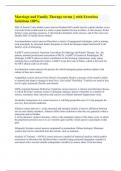Karl Marx and Social Class
● Class Struggles
○ Reading: “Manifesto of the Communist Party” (Karl Marx and Friedrich Engels)
Class Consciousness
Max Weber and Social Status
Income Inequality in Canada
● Reading: “On (Not) Getting By in America” (Barbara Ehrenreich)
Poverty
Key Terms
Karl Marx & Social Class
Social Class
● Social Class: groups of people who play different roles in the productive system
● 2 Types of Classes (context of capitalism):
○ Capitalist (bourgeoisie): owns means of production and property
○ Worker (proletariat): own capacity to labour
● r/s between capitalists and workers:
○ Cannot exist w/o one another
○ Coercive by nature
■ Workers need capitalists because they need money SO capitalists are able to pay
them low wages, give poor working conditions, longer hours etc
■ Marx argues that capitalism continues to exist via this exploitation of workers’
labour and subsequent oppression (r/s is unequal = class struggles)
Class Struggle
● Class Struggle: conflicts b/w those who own means of production (capitalists) and those who own
their own labour power (workers)
● Capitalism vs Socialism
○ Capitalism: economic system in which businesses are privately owned and good are sold on
the market for profit
■ “dictatorship of the bourgeoisie”
○ Socialism: economic system featuring a collective ownership of the means of production
■ “dictatorship of the proletariat”
■ Marx fought for the implementation of a socialist economic system ie; socialism
● Exists because classes want different things and have different interests
○ Capitalists
■ Want to make as much money as possible & extract surplus value (amount of money
that capitalists get to keep after paying for their workers’ wages)
■ Does this by keeping wages low, having workers work quickly, and setting long
hours
■ Determines social systems, relations, class struggles, and ideologies in a society
○ Workers
■ Want to make a living wage, safe working conditions, decent hours
Reading: “Manifesto of the Communist Party” (Karl Marx and Friedrich Engels)
● Capitalism can make many problems for workers
● Inequality b/w capitalists and workers can be severe
● Number of workers > Number of capitalists - why is there no uprising?
○ Ideology: sets of conscious and unconscious ideas of beliefs that govern and guide people’s
lives
, ■ Dominant ideologies are those of the dominant class (in that period)
■ Ideologies are “invisible” because they are considered natural and are therefore
accepted by those within the society
■ E.g; Canadian Ideology of Meritocracy
● Meritocracy: idea that people will achieve based on their own merit
● Supports idea that you earn as hard as you work
● Benefits capitalists and encourages workers to buy into system of capitalism
(promotes belief that we can become rich if we work hard)
● BUT an individual’s social class shapes an individual’s educational
opportunities and social connections so it plays an important role in
determining successes
○ False Consciousness: willingness to believe in ideologies that support the ruling class but are
actually disadvantageous to working-class interests
■ Workers in capitalism develop false consciousness
■ Dominant ideologies will support and serve interests of dominant class
■ Blunt working class’s desire to unite and demand equality
■ Social institutions (e.g; education systems, mass media, family) teach us these
ideologies and perpetuate them
● Capitalists use the government to further own interests
○ State is used to sustain the class system that benefits the ruling class
○ State does not reflect the vast majority of people (workers)
○ BUT is complicated in a democratic society where workers are able
to vote
■ Capitalists are able to persuade workers to accept
concentration of power in their hands
■ Done by capitalists control of ideas through institutions or
(if this fails) coercive methods e.g; police, military, judicial
system etc
Class Consciousness
Class Consciousness
● Class Consciousness: term used in Marxist theory to refer to people’s beliefs regarding their social
class and class interests
● An awareness of what is in the best interests of one’s class
● Pre-condition for organising into a “class for itself”
● 2 Categories of People:
○ Class in itself: people with a common relation to the means of production (e.g; workers)
○ Class for itself: group organised in active pursuit of its own interests (e.g; unionised workers
pushing for better working conditions)
Unions
● Unions: organisations of employees who work together to negotiate a variety of common matters
(e.g; pay, benefits, working conditions etc)
● Trade Union Density: percentage of wage earners in a population who are part of a union
○ US: Declining & Canada: Higher - why?
■ Globalisation and technological advances (both)
■ Canada labour laws and public policies are more supportive of unions
■ Process of creating a union in Canada is faster
■ Shows how public policies and laws can shape larger social structures in society
(e.g; unionisation rates)
● Difficulties encountered:
○ Ideological barriers presented by capitalists
○ Structural impediments (e.g; laws)










